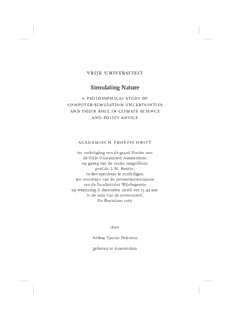Table Of Contentvrije universiteit
Simulating Nature
a philosophical study of
computer-simulation uncertainties
and their role in climate science
and policy advice
academisch proefschrift
ter verkrijging van de graad Doctor aan
de Vrije Universiteit Amsterdam,
op gezag van de rector magnificus
prof.dr. L.M. Bouter,
in het openbaar te verdedigen
ten overstaan van de promotiecommissie
van de faculteit der Wijsbegeerte
op woensdag 6 december 2006 om 15.45 uur
in de aula van de universiteit,
De Boelelaan 1105
door
Arthur Caesar Petersen
geboren te Amsterdam
promotor: prof.dr. J.A. Radder
copromotor: prof.dr. P.P. Kirschenmann
Simulating Nature
a philosophical study of
computer-simulation uncertainties
and their role in climate science
and policy advice
Arthur C. Petersen
hetspinhuis
apeldoorn–antwerpen
2006
Distribution inUSA, Canada, Latin-America &UK
by Transaction Publishers
isbn978 90 5589 280 8
© 2006, Het Spinhuis, Amsterdam
Nopartofthispublicationmaybereproducedortransmittedinanyformorbyany
means,electronicormechanical,includingphotocopy,recording,oranyinformation
storage and retrieval system, without permission from the copyright owner.
Cover design: Marijke Jansen
Cover graphics: Figure 6.1a of this study (p. 118). © 2001IPCC.
Lay out: Hanneke Kossen
HetSpinhuisPublishers – p.o.Box960 – 7301beApeldoorn–theNetherlands —
www.spinhuis.nl
Contents
Preface ix
Listofabbreviationsandacronyms xi
1 Introduction 1
1.1 Framing of the problem 3
1.2 Defining computer simulation and positioning it in science 6
1.3 Philosophical approach 9
1.4 Brief outline of this study 13
2 Thepracticeofscientificsimulation 17
2.1 Introduction 17
2.2 The simulation laboratory 18
2.3 Elements of simulation-laboratory practice 22
2.3.1 Conceptual and mathematical model: general theory,
models and parameterisations 22
2.3.2 Model inputs: proximity of simulation and
material experimentation 27
2.3.3 Technical model implementation:
the reproducibility of simulation 28
2.3.4 Processed output data and their interpretation: visualisation and
understanding 34
2.4 Plurality of methodologies for model development
and evaluation 36
2.5 Plurality of values in simulation practice 42
2.6 The practices of simulation and experimentation compared 45
2.7 Conclusion 47
3 Atypologyofuncertaintyinscientificsimulation 49
3.1 Introduction 49
3.2 Locations of simulation uncertainty 51
3.3 The nature of simulation uncertainty 52
3.4 The range of simulation uncertainty 53
3.5 Recognised ignorance in simulation 56
3.6 The methodological unreliability of simulation 57
3.6.1 The theoretical basis of simulations 58
3.6.2 The empirical basis of simulations 59
3.6.3 Agreement of simulations among each other 61
3.6.4 Peer consensus on the results of simulations 61
3.7 Value diversity in simulation practice 62
3.8 The uncertainties of simulation and experimentation
compared 63
3.9 Conclusion 63
4 Assessmentofsimulationuncertaintyforpolicyadvice 65
4.1 Introduction 65
4.2 The ‘sound science’ debate 68
4.3 The challenge of post-normal science 70
4.4 The role of simulation uncertainty in policy advice 78
4.5 Therivm/mnpguidance on uncertainty assessment
and communication 84
4.6 Conclusion 91
5 Thepracticeofclimatesimulation 95
5.1 Introduction 95
5.2 Functions of climate simulation 99
5.3 Varying climate-model concreteness 102
5.4 The social context of climate-simulation practice 111
5.5 Evaluating the plurality of climate-simulation models 114
5.6 Conclusion 116
6 Uncertaintiesinclimatesimulation 117
6.1 Introduction 117
6.2 A general overview of uncertainty in climate simulation 121
6.3 Climate-simulation uncertainty and the causal attribution
of temperature change 127
6.4 Conclusion 134
7 Assessmentsofclimate-simulationuncertaintyforpolicyadvice 135
7.1 Introduction 135
7.2 The Intergovernmental Panel on Climate Change (ipcc) and
its communication of climate-simulation uncertainty 138
7.2.1 TheIPCC review process 148
7.2.2 Sceptical criticism of the review process 153
7.2.3 Negotiating the wording of the summary for policymakers 158
7.2.4 IPCCguidance materials for uncertainty assessment
and communication 160
7.3 An example of exploiting societal perspectives to communicate
climate-simulation uncertainty 161
7.4 Conclusion 166
8 Conclusions 167
8.1 Uncertainty associated with scientific simulation 167
8.2 Differences and similarities between simulation and experimental
uncertainty 170
8.3 Assessment and communication of scientific simulation
uncertainties in science-for-policy 172
8.4 Uncertainty associated with the simulation-based attribution
of climate change to human influences 173
8.5 Assessment and communication of attribution uncertainty
inipcc(2001) 173
Appendix 175
Notes 183
References 199
Samenvatting 211
Preface
The issue of uncertainty in science and policy has intrigued me for already
more than a decade. After I had completed my ma-thesis on consensus in
climatescienceinthesummerof1995,IquicklydiscoveredthattheDutch
climatescientistswithwhomIdidmyatmosphericresearchwereveryopen
abouttheuncertaintiesintheirscienceandweregenuinelyinterestedinmy
philosophical analyses. This stimulated me to ask my former thesis super-
visor,HansRadder,aboutthepossibilitiesforpostdoctoralresearchinphil-
osophyofscience.Hanswassuccesfulinobtaininguniversityfundingfora
three-yearprojectontheroleofcomputersimulationinscienceandpolitics.
Thus,afterIhadfinishedmydissertationinatmosphericscienceatUtrecht
University,Ireturnedtomyalmamater,theVrijeUniversiteitinAmsterdam,
as a postdoctoral research associate in April 1999. It was decided that the
result of the project should be a second dissertation and that I should also
enrollintheNetherlandsGraduateSchoolofScience,TechnologyandMod-
ernCulture(wtmc).Tosomeitmayseemoddthatapostdoctoralresearcher
returnstograduateschool,butIfoundthisperiodtobeintellectuallyoneof
themoststimulatingandfruitfulperiodsofmycareerandIstillretainmany
fondmemoriesofthepeopleImetattheworkshops,thesummerschoolsand
thewinterschoolthatIattended.IenjoyedbeingpartoftheFacultyofPhil-
osophy and I would like to thank both my dissertation supervisors, Hans
Radder and Peter Kirschenmann, for guiding me through this project, for
theirincisivelycriticalcommentsthatalwaysledtosignificantimprovements
in my thinking and the text, and for their confidence that I would – some-
time–completethisproject.Simplyput,withoutthemthisbookwouldnot
exist.Severalotherpeopleprovidedhelpfulmaterialandcommentsthatstim-
ulatedmywork.Iwouldliketomentioninparticular:MarcelBoumans,Silvio
Funtowicz,StephanHartmann,PeterJanssen,ChunglinKwa,HarroMaas,
MaryMorgan,JeromeRavetz,JamesRisbey,SergioSismondo,Marjoleinvan
Asselt,andJeroenvanderSluijs.
When I was about halfway through the project, I obtained a position as
seniorscientistinuncertaintyassessmentandcommunicationattheNether-
landsEnvironmentalAssessmentAgency(mnp),andIlefttheVrijeUniversi-
x Simulating nature
teiton1January2002.Thenewjobturnedouttobebeneficialfortheproject.
Althoughittooknearlyanotherfiveyearstofinishthisstudy,Ifeelthatthe
ideasthatarenowlaidoutinitaremuchmorematurethanwhatIcouldhave
offeredafterthreeyearsofresearchasanoutsider.Thetwodirectorsofmnp,
KlaasvanEgmondandFredLangeweg,havegivenstrongsupporttothedif-
ferent research activities that I have undertaken within the mnp. There are
many other mnp colleagues whom I should mention here. However, I will
limitmyselftothankingfourcolleagueswhocontributedmosttothisstudy:
ArthurBeusen,PeterJanssen,JohanMelse,AntonvanderGiessen.
Inthisstudy,asidefromanalysingtheroleofsimulationinnaturalscience
andpublicpolicyingeneral,Ifocusonclimatescienceandpolicyinparticu-
lar.Thischoiceisobviouslyrelatedtomyowndisciplinarybackground,but
also to the high societal and political importance of appropriately assessing
and communicating uncertainties in climate simulation. My ma-thesis al-
readyaddressedtheIntergovernmentalPanelonClimateChange(ipcc)and
thecontroversialnatureofitsSummariesforPolicymakers.Howcanonefor-
mulatea‘consensus’aboutwhatweknowaboutclimatechange,ifclimatesci-
entistsintheirdailyscientificpracticeseemtodisagreeonsomanypoints,
particularlywithrespecttowhatconstitutesa‘good’climatemodel?Formy
studiesofclimatescienceandpolicy,Iamparticularlyindebtedtothefollow-
ingpeople,whowereintervieweesand/oradvisers:FonsBaede,HenkDijk-
stra,DavidGriggs,JohnMitchell,JamesRisbey,CorSchuurmans,RobSwart,
PaulvanderLinden,AadvanUlden,KoosVerbeek,andHansvonStorch.
Asidefrommydissertationsupervisors,manypeoplegavecommentson
different portions of the manuscript in its various stages. I would like to
thankinparticular:BenBakker,HenkdeRegt,MaartenKleinhans,Martin
KrayervonKraus,ChunglinKwa,AndreaScharnhorst,FritsSchipper,Paul
Wouters, and again Sergio Sismondo and Marjolein van Asselt.
Finally, I would like to acknowledge copyrighted material and additional
financialsupport.PartsofChapters1and4arecurrentlyinpressasabook
chapter titled ‘Simulation uncertainty and the challenge of postnormal sci-
ence’,inLenhardetal.(eds.),Simulation:PragmaticConstructionsofReality–
SociologyoftheSciences,vol.25,pp.173-185(©2006Springer).Inadditionto
supportfromtheVrijeUniversiteitandthemnp,theVerenigingvoorchris-
telijkwetenschappelijkonderwijs,theAmericanGeophysicalUnion,andthe
Dutch National Research Programme on Global Air Pollution and Climate
Change made it possible to attend several conferences and ipcc meetings.
And the Netherlands Graduate School of Science, Technology and Modern
Culture(wtmc)financiallycontributedtothepublicationofthisstudy.
Description:Arthur C. Petersen het spinhuis .. nonlocal patterns in the practices, processes
and products of science and .. As was argued by Adam Morton, in order to re-.

